Cardiff Rugby's band of brothers unite for the promise of brighter times ahead

“Hey, Mr Cardiff Rugby” bellows one of the city’s most recognisable residents from an outdoor table. Matt Sherratt, Cardiff’s head coach, raises a hand in greeting. “How’s it going?” he asks. “All the better for seeing you my friend,” replies Ninjah, the dreadlocked eccentric, so often seen patrolling the city streets, playing drums on the bins, reciting poetry, and generally enlivening the place.
It’s a snapshot of a unique city. Cardiff may be a European capital, but it often has the feel of a village. It’s not an easy place to be anonymous.
It’s also a reminder that the rugby club is still tightly woven into Cardiff’s history – something that’s not lost on Sherratt, an “incomer” from “the other side of the bridge.” It may no longer have the biggest chequebook, or boast a star-studded squad, but its pull remains strong.
“What other rugby club has a location like this?” asks Sherratt, “where you can walk up the ramp after training, and straight into the heart of the city? Sometimes players need reminding of that.”
On the day we meet, it strikes a particularly resonant chord, as the main drag of St Mary’s Street is bathed in warm spring sunshine, and alive with colour.
“Where I’m from, if you talk about Cardiff – the rugby and the city – people’s eyes light up. It’s got everything, beaches, nightlife, sport, it’s unbelievable. But when you’re in it you take it for granted; you see what’s wrong with it rather than what’s right.”
After wrestling with its identity for a while, before deciding to ditch the “Blues” suffix, there’s been a concerted effort to reclaim the glories of its past, and Sherratt is keen to embrace that.
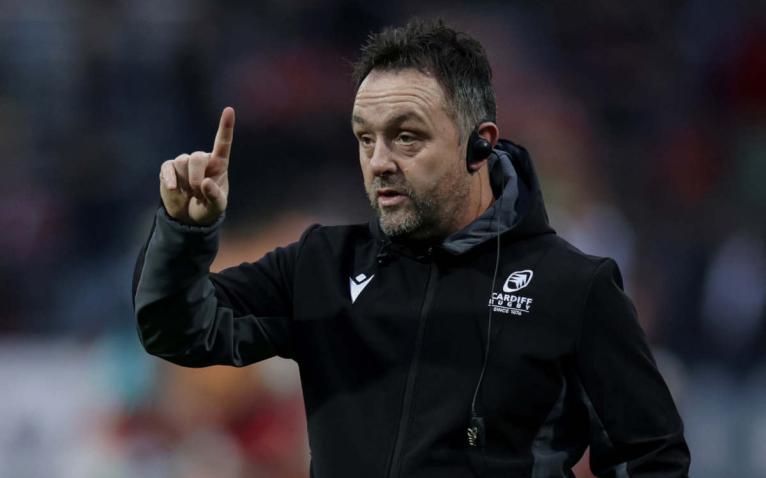
“It was a risk because I’m quite sentimental about stuff like that but are the players?” he continues. “What I found out was that they’re really proud to represent the city. I showed them a lot about the history of the club; the players that have played here, the fact they invented the term “fly-half”, that it was the first club to play with seven backs.”
The man in charge of guiding the famous old club through the latest bout of turbulence enveloping Welsh rugby likens them to the Newcastle Football Club of a decade or so ago; “a great club in a great city that just needs a reboot.”
“I’ve not rubbed their noses in it (the history) because it dilutes it, but little things – like when we played Toulouse – I reminded them that we were the first clubs to contest the first ever Champions Cup final. The likes of Mason (Grady) and (Theo) Cabango probably didn’t know that, and it was like ‘oh, wow’”.
He’s also invited the likes of Geraint Thomas and Richard Parks to deliver motivational speeches, to explain what Cardiff means to them. “The club” he affirms, “has a strong DNA.”
A new generation of talented youngsters has emerged, the Arms Park turnstiles have been revolving steadily, the club is playing an exciting brand of rugby, and has attracted private investment at a time many are questioning rugby’s economic viability.
“What I’ve noticed about some coaches in past is that it’s all about them. They’re bigger than the club so it’s the coach’s values. I’ll be gone in two years, five years, who knows, but while you’re here, you’ve got to deliver for the club. Yes, it’s got to look like what you want it to look like, but it can’t be your values, because the club’s already been here for 150 years.”
There are five rounds left of the regular season, and Sherratt has invited me to shadow him for the day. Cardiff are currently twelfth in the table, and eleven points off the play-off places. But thanks in part to their head coach’s infectious optimism, the narrative surrounding them has largely been positive. A new generation of talented youngsters has emerged, the Arms Park turnstiles have been revolving steadily, the club is playing an exciting brand of rugby, and has attracted private investment at a time many are questioning rugby’s economic viability. It’s a stark contrast to the negativity swirling around regional rivals, the Scarlets, whose fans are in open revolt. Both clubs have won the same amount of games: three.
What’s separated them has been the scale of their defeats. With a few exceptions, Cardiff’s losses have been marginal, and they’ve lost a few they should have won. “We’ve had three red cards early in games,” Sherratt points out. “Benetton at home, we should have won, but the red card changed everything. Against the Scarlets we started really well, and then Ellis was red carded. I’m not saying we would have won but we’d have had a much better chance. Connacht again was a tight game, and Rey was sent off after 17 minutes. Zebre scored in the 6th minute of injury time. There are so many I have looked at that and thought, if we’d have taken half of those, we’d be in the top eight.”
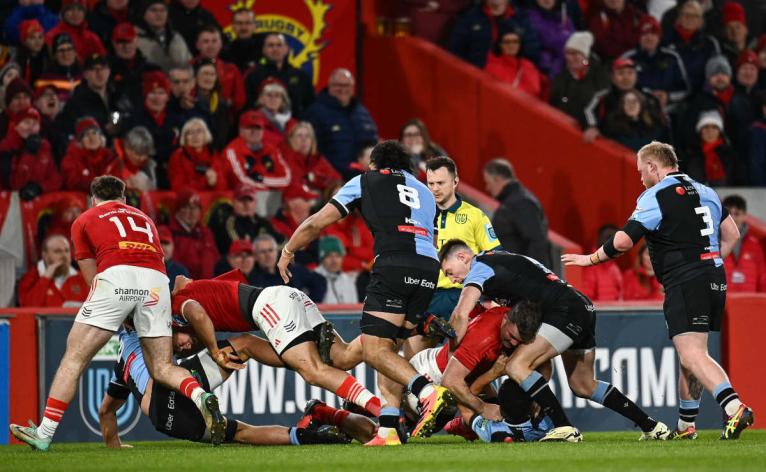
If you need evidence of the paucity of Cardiff’s resources, take a look in their coaches office. A poky room overlooking the Arms Park, with a couple of whiteboards, and just enough space to accommodate the four members of their coaching panel, two of whom are hulking former props. Opposite Sherratt sits former Wales scrum-half and skills coach, Richie Rees, a man whose near-permanent smile radiates optimism and enthusiasm. Across from him sits the imposing Gethin Jenkins, Wales’s most capped front-row forward, who’s in charge of defence. Then there’s Scott “Bubba” Andrews, who looks after scrums and lineouts.
Sherratt chuckles with a cynicism borne of experience when I point out they’re a little light on personnel. “We were without a defence coach until August”, he reminds me, “and Geth is still only part-time. Bubba was with the academy and doing scrum and lineouts. You won’t find another club in Europe with one person doing both. Richie was just doing skills, now he’s doing some of our first phase attack.” Jenkins’ part-time contract precluded him from travelling to away games, meaning when Cardiff were being buried under a first-half avalanche of points against Toulouse in December, there was no defence coach in the changing room.
Sherratt himself was an assistant himself until eight months ago before stepping into the vacancy created by Dai Young’s departure. And if the coaching resources are stripped bare, the playing squad has been arguably worse. We’re all well aware of how shrinking budgets have led to smaller squads, but at one point during pre-season, Cardiff – astonishingly – had just had seven fit players available to train.
We’d be going away from home without the right amount of travelling reserves, and I’d be praying in the warm-up that we didn’t get an injury because we haven’t got a prop in the club. That’s pretty unique.
Matt Sherratt
“I’ve genuinely had to beg steal and borrow” he explains. “We had to get Ciaran Parker (former London Irish prop) in late, Alun Lawrence from Jersey, Willis (Halaholo) has been in and out of contract three times, Rey (Lee-lo) wasn’t signed, Harri Millard wasn’t signed. Ben Donnell came from Gloucester, Gabe (Hamer Webb) has been in and out of the building twice. Josh Reynolds and Max Clark are on loan from the Dragons. Add to that all the academy boys coming in, and it’s been a real challenge logistically just to get a squad together.”
“We’d be going away from home without the right amount of travelling reserves, and I’d be praying in the warm-up that we didn’t get an injury because we haven’t got a prop in the club. That’s pretty unique.”
What would have happened had that been the case, I ponder aloud. “Bubba’s on!” he replies, with a hearty chortle. “He’d do alright until the first scrum.”
At this point, Gethin Jenkins stands up with his laptop and signals he’s ready for his defensive briefing. It’s the first time he’ll be using a clicker to swap between slides and his colleagues rib him mercilessly on the way down, saying they’ll be the first to start the slow hand clap from the back if it doesn’t work. He glowers at them the same way he used to at a teammate who missed a tackle.
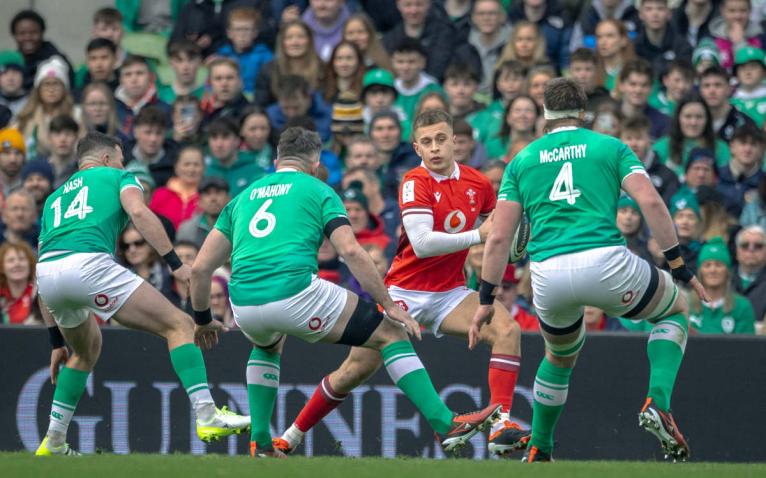
The lively hubbub in the team room drops to a hushed silence when he stands to address the squad. His briefing is pithy and focused. Against Ulster, he explains, they’ll have to win the battle of the gain line. He shows several clips of Ulster’s attacking formation and stresses the need to hit them hard and knock them backwards.
Club stalwart Josh Turnbull announced his retirement the previous night after more than 330 top-flight appearances, and Jenkins’ namechecks him. “I’m not sure I ever played with anyone who was as relentless as Josh” he says. “He may have played more than 300 times but look at how many of those were for eighty minutes.” Be like Josh, is the crux of the message. Ulster may lack the deception or the sophistication of some of their provincial rivals, but they run hard and relish the rough stuff.
The team is announced, and my eye is drawn to one name in particular. That of Taulupe Faletau, who’ll be making his first appearance since breaking his arm during the World Cup.
The genial Richie Rees is a bouncing ball of energy, yelling and cajoling, calling players into formation, ensuring concentration levels remain high. Amongst it all is Sherratt, whistle between his teeth, eyes flickering, taking it all in.
Within half an hour, the squad is out on the pitch, and with Faletau among a raft of players returning from long-term injury, there’s a bountiful look to it. It’s a far cry from the loose rabble that assembled here in pre-season. The bonhomie of the team room has been replaced by a steely focus, as the unit sessions get underway framed by the gleaming spires of the Principality Stadium.
At one end, the backs go through their strike moves while at the other the forwards rehearse their lineouts. The languid, laid-back figure of Teddy Williams transforms into an authoritative general, calling the shots and barking orders. On the terraces, zipped up against the icy wind, Wales forwards coach Jon Humphreys looks on earnestly.
After the units sessions, we move on to a fifteen-on-fifteen block, where the “sheep” (non-playing fifteen) run Ulster-inspired plays to test the starting XV’s defensive instincts. These haven’t been revealed beforehand, so the coaches can see how the starters respond on the fly.
During the eight minutes that follow, the genial Richie Rees is a bouncing ball of energy, yelling and cajoling, calling players into formation, ensuring concentration levels remain high. Amongst it all is Sherratt, whistle between his teeth, eyes flickering, taking it all in.
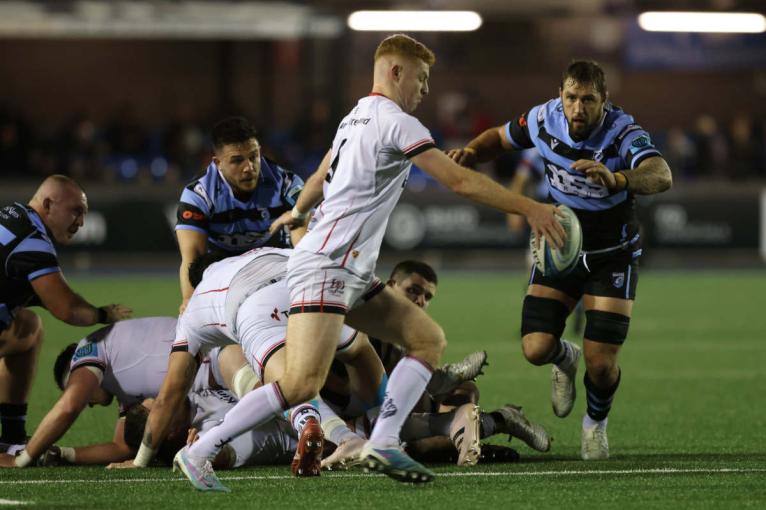
His move “upstairs” was on the condition he didn’t relinquish his tracksuit, and it’s important to him that he’s out there on the paddock, keeping his tools sharpened. “That’s the bit I love and why I’ve stayed in game for the amount time I have” he later explains. “It’s how I develop relationships with the players and staff. I can see how you might drift off into more ‘adminy’ stuff, and I have enjoyed that too, but ultimately, I love meetings, detail and actual coaching; being part of a group.”
He fears he’d lose the respect of the players if he wasn’t out there among them. “You’ve got to be yourself”, he insists. Attempting to reinvent himself was never an option. “My first job was as a primary school teacher and kids could sniff your mood within five seconds of walking into a room. Rugby players are the same. If you go in and try to act like a head coach, they’ll laugh you out of the changing room.”
His teaching background has taught him that relationships are what breeds success. Having seen other head coaches put a bit of distance between themselves and their players, he was determined to maintain an open-door policy. Gauging a players’ mood and responding accordingly remains a vital skill when you’re man-managing a large group of testosterone-fuelled young men.
If Cardiff’s success can be measured by anything this season, it’s the number of players the club has supplied to the Wales squad. More by accident than design, a number of raw tyros have caught the eye and been swiftly elevated to test level.
Take the situation at hooker. Cardiff’s club captain and first-choice Liam Belcher was tipped by many for a Six Nations call-up. Instead, Warren Gatland opted for his understudy, Evan Lloyd – a promising youngster who’d nevertheless played just six professional games, all of them as a substitute.
How did Sherratt manage the fallout?
“It depends on the personalities” he says. “Belch is the thermometer of the club. He’ll get on as well with an 18-year old as he will with Toby. Evan was understandably emotional when he got in, but I made a point of saying, ‘Belch, you’ve got a lot to do with this.’” He goes on to reveal that Belcher had spent the previous 3-4 months taking Lloyd to Pentwyn Leisure Centre and helping him one-on-one with his lineout throwing.
“You won’t find a better role model than Belch” he goes on. “Both are good kids, and the reality was that Evan went in as a project player really. If it had been based on performance this year, Belch would probably have been in that spot.”
If Cardiff’s success can be measured by anything this season, it’s the number of players the club has supplied to the Wales squad. More by accident than design, a number of raw tyros have caught the eye and been swiftly elevated to test level.
But despite the flow from Arms Park to its next-door neighbour, the word “alignment” is one that frequently comes up, usually preceded by “lack of.”
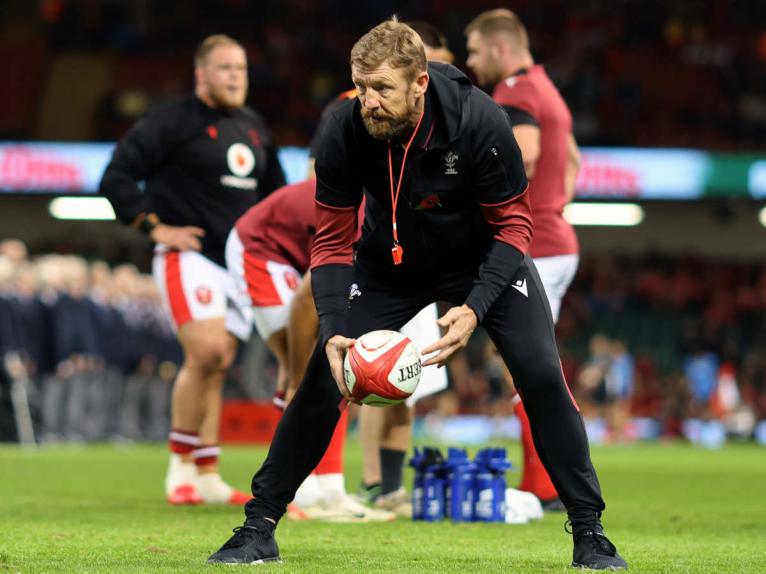
To say that Warren Gatland ruffled a few feathers with his comments about a lack of professionalism at the regions would be an understatement. The fact he quoted Alex Mann, Wales’s incumbent blindside, focused the lens more keenly on Cardiff.
Sherratt – ever the diplomat – tried to dampen rather than fan the flames and after his baptism in this year’s Six Nations, Mann has been told by Wales to pile on the pounds.
So, how does this happen? Does the national side co-ordinate fitness plans with the regions to achieve such goals? “If I’m honest there’s nothing formal” Sherratt says. “It happens by relationships. Robin Sowden-Taylor (Wales S&C coach) was here, and he’s good mates with Cam (Ryan Cambell, Cardiff S&C coach), so they talk informally, but it’s just common sense with Manny. He does need to get a bit bigger, but he doesn’t need to lose his footwork and work rate. If you tell Manny to try and grow six inches he will somehow. We’re trying to find that middle ground.”
Sherratt reserves special praise for Wales defence guru, Mike Forshaw, who’s been in several times and “opened up a bit of dialogue”. He’d like a bit more though, for the alignment to be better and the relationships more formalised, but having been an assistant coach with Wales he understands both sides. “I’ve worked in Wales camps and it’s so intense, for a couple of weeks after you do need to decompress. But maybe after that there should be something in the diary where we meet the coaches and discuss the players, hopefully they’re planning to do that. We could be so much more joined up.”
Managing expectations has been key this season. Never have the words “rebuild” and “reset” been bandied around with such abandon. While Welsh defeats have come wrapped in caveats about shrinking squads and depleted bank accounts, Sherratt well knows that the fans’ patience will eventually start to wear thin. “I’m not naïve” he says. “At some stage people will get bored with the sob story.”
The mood music in Wales has been veering towards the morose for some time. Think Nine Inch Nails jamming with Elliott Smith. And the hidden track at the end might well be called “it’ll get worse before it gets better.” That’s because budgets are set to drop further, to £4.5m next year.
We asked for a better facility, for more staff and for the academy to be improved and they’ve delivered on all of this. We’ve got a forwards coach coming in, a head of recruitment, another analyst, another S&C coach. We’re almost adding a third to our staff, which will ultimately benefit the players.
Matt Sherratt
There is talk at Cardiff of their private owners pumping that up to £5.5m, but that would need to be ratified by the Professional Rugby Board and the WRU. Even if it’s approved, Sherratt warns it’s no silver bullet. When he was here as an assistant under Danny Wilson, the budget was as high as £6.8m. “Money’s not everything, and you can still get a squad to overperform” he says, “but I need to discuss what the expectations are for next season because if the expectation is to get in the top eight, I feel I’m going to be getting judged on something that doesn’t match where the club is at.”
He also rejects the notion that further investment will allow Cardiff to make big-name Jordie Barrett-style signings. Any extra cash will be spent on infrastructure which he says is entirely the right call. “We asked for a better facility, for more staff and for the academy to be improved and they’ve delivered on all of this. We’ve got a forwards coach coming in, a head of recruitment, another analyst, another S&C coach. We’re almost adding a third to our staff, which will ultimately benefit the players.”
The new gym, he admits, isn’t going to be “top class” but “at least it’ll be on one site, and we’re not shuttling back and forth from Pentwyn to here, making boys sit in the car for half an hour a day for no reason.” He has a wide circle of confidantes in the game, some of whom have advised him differently – “some would say if they’re offering it to you for the squad, just take it, but I’ve seen that at other places like when I was first at Bristol. If your academy’s not right, your facility’s not right and you haven’t got the right staff in the building, do you really want a marquee signing coming to the club who’s going be there for two-three years? You might get 30 games out of him, you might get five, who knows?”
Build first, and then they’ll come. “Look at the teams we’ve played this season” he continues. “Bath, Toulouse, Racing – they haven’t got a bunch of superstars training on a split site with four members of staff, have they? We’ve got to get that bit right first. Of course we want to be more competitive on the field, but – and this sounds like an excuse from coaching point of view – we’ve got to win off the field first, and if that takes a bit of pain and aggravation so be it. The selfish thing to do would be to say, ‘don’t worry about facilities, don’t worry about structure, let’s put it into the team.’ That might be right, but that’s not what my instinct tells me.”
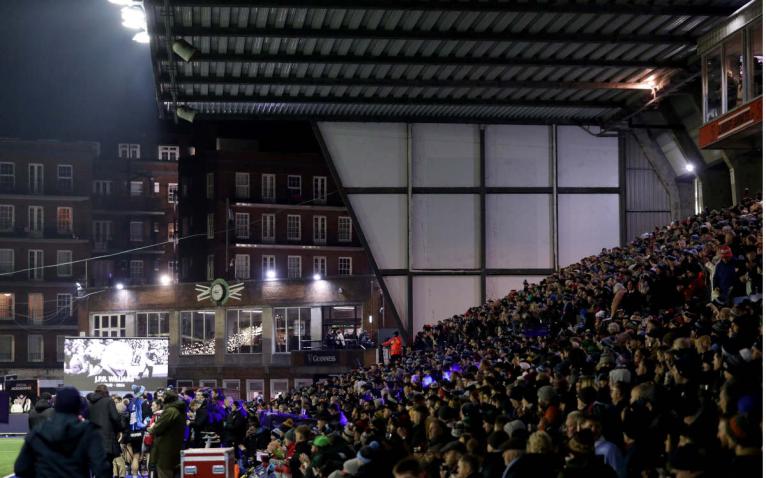
So the Faf de Klerk rumours are just that then? Sherratt shakes his head with a chuckle. “I’ve heard them too” he laughs. “How good would it be? It would get the crowds in for sure. But I’m not sure it’s the right order of priorities. We can’t afford a defence coach, there’s a bums and tums class going on next to a British Lion lifting weights, and the gym’s in a marquee, but we’ve got a 600k scrum half!”
While expectations are being tempered, there is still a (remote) mathematical chance Cardiff could progress to the URC playoffs. The game against Ulster is a proverbial ten-pointer. Ulster begin the weekend in eighth, eleven points ahead of Cardiff, but an away victory will at least make things interesting. Sherratt admits that while he tries to control the narrative to fans and media, he has to keep the competitive flames ablaze internally. “I think that has been something for me to keep a balance on. At the start of the season, Teddy Williams asked what game we’d be targeting. Valid question. I remember looking at the fixture list and thinking ‘what games aren’t we going to target?’
Recent narrow defeats away to Glasgow and Munster have changed his mindset. “I was no longer pleased with coming home with a point. Glasgow put 50 on us last season, and Munster away is always a tough ask, and if you’d asked me before would I be satisfied with losing bonus points in both, I’d have taken that. But then had a week off and thought ‘how can we turn one point into four points?’ I had really good look at our game and thought, rather than try to cover everything, if there are just two things that can help us turn one point into four, what are they? Let’s just hammer those.”
“There is so much happening in Welsh Rugby. The PRB, the RMB, the FCR – there seems to be a board for everything. I sit here and listen to all the acronyms, and I haven’t got a clue what’s going on, so it’s come to stage now where I’m like ‘when you know what budget is, tell me and I’ll act on it.”
Matt Sherratt
While Sherratt is aware of the maths – “I genuinely think we can beat Ulster away, and Edinburgh here, and go to South Africa with a spring in our step” – he rarely brings up the league table with his players. “There’s no point at the moment. We’re not fighting for that, we’re fighting to improve the club. I’ve never said we can be top eight; all I’ve said is we can beat Ulster. They want to hear that. You see the likes of Josh Adams and Toby Faletau and they’re competitors. They don’t want to go to Ulster and be plucky losers.”
Matt Sherratt never had ambitions to be head coach. He was thrust into the role by circumstance, but the experience has helped crystallise his priorities. Getting bogged down in endless bureaucracy isn’t one of them. “There is so much happening in Welsh Rugby. The PRB, the RMB, the FCR – there seems to be a board for everything. I sit here and listen to all the acronyms, and I haven’t got a clue what’s going on, so it’s come to stage now where I’m like ‘when you know what budget is, tell me and I’ll act on it.”
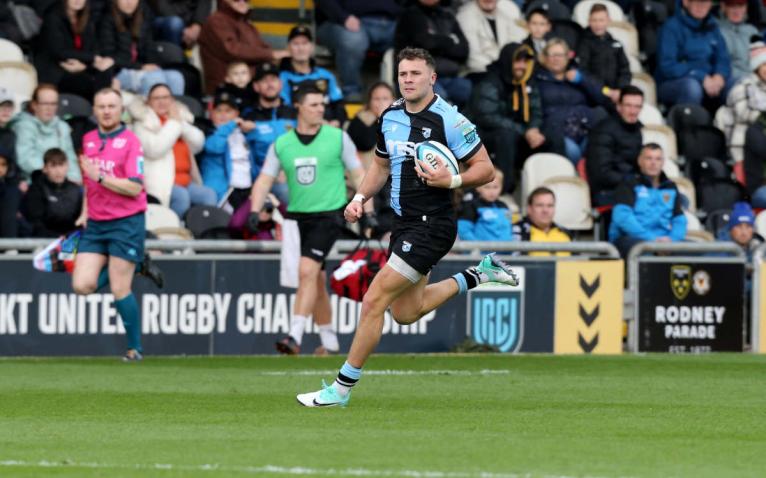
If you waste all your energy and emotion on what’s happening off the pitch, worrying about the WRU, about the budget, about when the next meeting is, by the time you stand in front of the players you’re done. I try to focus 90% on the rugby as much as possible, because I can’t control the other stuff. I can’t convince an owner to put more money in, I can’t hurry the WRU up, so I tried as much as possible to shield myself from that. I think I know what not to fight now. If it’s something that impacts staff and players, I’ll go hard at it. If it’s something that’s a ‘nice to have’, there’s no point getting too irate about it.”
Back on the training pitch, the session is over but most of the players are still out there doing their extras. Gethin Jenkins is putting a few of them through some punishing tackling drills, while Ellis Jenkins is giving some pointers to Alex Mann and Lucas de la Rua on the art of the jackal. A short distance away, some of the non-playing 23 are enduring fitness extras – runways and shuttles under the exacting command of Ryan Campbell.
Mason Grady, another of Cardiff’s new internationals, makes his way towards the tunnel. His performances have attracted the attention of a number of English clubs, but Sherratt is quietly confident he’ll stay. “He’s happy, his mates are here and he’s playing really well. For me that Munster game was the best he’s ever played for Cardiff. He’s always going to score a wonder try or barrel his way over from a couple of metres, but his talking, his scanning, his work off the ball, was excellent. He’s an athlete, but I saw loads of signs of him starting to understand where he had to put himself on the pitch to make most of his athleticism. If he keeps going that way, he’ll be a genuine top end player.”
This might sound sentimental, but I’m not coaching for my job, I’m looking at what’s best for the club. I don’t get massively stressed by it and if in five years, someone comes in and finds the squad in decent place, the facility is there and there’s good infrastructure, I’ll know I’ll have done a decent job.
His presence, and the emergence of others like Mackenzie Martin, Cam Winnett, Alex Mann and Evan Lloyd means there is plenty to be positive about. And Sherratt is long enough in the tooth to take a broader perspective. “This might sound sentimental, but I’m not coaching for my job, I’m looking at what’s best for the club. I don’t get massively stressed by it and if in five years, someone comes in and finds the squad in decent place, the facility is there and there’s good infrastructure, I’ll know I’ll have done a decent job.”
Asked if he despaired when he saw Leinster announce yet another world-class signing in Jordie Barrett, he shakes his head ruefully. “I’ve still got a bit of the supporter in me, so I hope we play against him. Everyone’s got a unique set of circumstances, we’ve just got to be in better place in July pre-season than we were last season, which, let’s be honest, isn’t going to be that hard!”









































Comments on RugbyPass
I bet he inspired those supporters just as much.
1 Go to commentsBen Smith Springboks living rent free in his head 😊😂
67 Go to commentsGood to hear he would like to play the game at the highest level, I hadn’t been to sure how much of a motivator that was before now. Sadly he’s probably chosen the rugby club to go to. Try not to worry about all the input about how you should play rugby Joey and just try to emulate what you do on the league field and have fun. You’ll limit your game too much (well not really because he’s a standard athlete like SBW and he’ll still have enough) if you’re trying to make sure you can recycle the ball back etc. On the other hard, you can totally just try and recycle by looking to offload any and everywhere if you’re going to ground 😋
1 Go to commentsThis just proves that theres always a stat and a metric to use to justify your abilities and your success. Ben did it last week by creating an imaginary competition and now you did the same to counter his argument and espouse a new yardstick for success. Why not just use the current one and lets say the Boks have won 4 world cups making them the most successful world cup team. Outside of the world cup the All Blacks are the most successful team winning countless rugby championships and dominating the rankings with high win percentages. Over the last 4 years statistically the Irish are the best having the highest win rate and also having positive records against every tier 1 side. The most successful Northern team in the game has been England with a world cup title and the most six nations titles in history. The AB’s are the most dominant team in history with the highest win rate and 3 world cups. Lets not try to reinvent the wheel. Just be honest about the actual stats and what each team has been good at doing and that will be enough to define their level of success.
19 Go to commentsHow is 7’s played there? I’m surprised 10 or 11 man rugby hasn’t taken off. 7 just doesn’t fit the 15s dynamics (rules n field etc) but these other versions do.
7 Go to commentsPick Swinton at your peril A liability just like JWH from the Roosters Skelton ??? went missing at RWC
14 Go to commentsLike tennis, who have a ranking system, and I believe rugby too, just measure over each period preceding a world cup event who was the longest number one and that would be it. In tennis the number one player frequently is not the grand slam winner. I love and adore the All Blacks since the days of Ian Kirkpatrick when I was a kid in SA. And still do because they are the masters of running rugby and are gentleman on and off the field - in general. And in my opinion they have been the majority of the time the best rugby team in the world.
19 Go to commentsHaving overseas possessions in 2024 is absurd. These Frenchies should have to give the New Caledonians their freedom.
21 Go to commentsBell injured his foot didn’t he? Bring Tupou in he’ll deliver when it counts. Agree mostly but I would switch in the Reds number 8 Harry Wilson for Swinton and move Rob Valentini to 6 instead. Wilson is a clever player who reads the play, you can’t outmuscle the AB’s and Springboks, if you have any chance it’s by playing clever. Same goes for Paisami, he’s a little guy who doesn’t really trouble the likes of De Allende and Jordie Barrett. I’d rather play Carter Gordon at 12 and put Michael Lynagh’s boy at 10. That way you get a BMT type goalkicker at 10 and a playmaker at 12. Anyways, just my two cents as a Bok supporter.
14 Go to commentsThanks Brett, love your articles which are alway pertinent. It’s a difficult topic trying to have a panel adjudicating consistently penalties for red card issues. Many of the mitigating reasons raised are judged subjectively, hence the different outcomes. How to take away subjective opinions?
9 Go to commentsYes Sir! Surprising, just like Fraser would also have escaped sanction if he was a few inches lower, even if it was by accident that he missed! Has there really been talk about those sanctions or is this just sensational journalism? I stopped reading, so might have missed any notations.
9 Go to commentsAI is only as good as the information put in, the nuances of the sport, what you see out the corner of the eye, how you sum up in a split second the situation, yes the AI is a tool but will not help win games, more likely contribute to a loss, Rugby Players are not robots, all AI can do if offer a solution not the solution. AI will effect many sports, help train better golfers etc.
45 Go to commentsIt couldn’t have been Ryan Crotty. He wasn’t selected in either World Cup side - they chose Money Bill instead. And Money Bill only cared about himself, and that manager he had, not the team.
28 Go to commentsYawn 🥱 nobody would give a hoot about this new trophy. End of the day we just have to beat Ireland and NZ this year then they can finally shut up 🤐
19 Go to commentsTalking bout Ryan Crotty? Heard Crotty say in a interview once that SBW doesen't care about the team . He went on to say that whenever they lost a big game, SBW would be happy as if nothing happened, according to him someone who cares would look down.. Personally I think Crotty is in the wrong, not for feeling gutted but for expecting others 2 be like him… I have been a bad loser forever as it matters so much to me but good on you SBW for being able to see the bigger picture….
28 Go to commentsThis sounds like a WWE idea so Americans can also get excited about rugby, RUGBY NEEDS A INTERNATIONAL CALENDER .. The rugby Championship and Six Nations can be held at same time, top 3 of six nations and top 3 of Rugby championship (6 nations should include Georgia AND another qualifying country while Fiji, Japan and Samoa/Tonga qualifier should make out 6 Southern teams).. Scrap June internationals and year end tours. Have a Elite top six Cup and the Bottom 6 in a secondary comp….
19 Go to commentsThe rugby championship would be even stronger with Fiji in it… I know it doesen’t fit the long term plans of NZ or Aus but you are robbing a whole nation of being able to see their best players play for Fiji…. Every second player in NZ and AUS teams has Fijian surnames… shame on you!!! World rugby won’t step in either as France and England has now also joined in…. I guess where money is involved it will always be the poor countries missing out….
90 Go to commentsNo surprise there. How hard can it be to pick a ball off the ground and chuck it to a mate? 😂
4 Go to commentsSometimes people just like a moan mate!
9 Go to commentsexcellent idea ! rugby needs this 💪
19 Go to comments